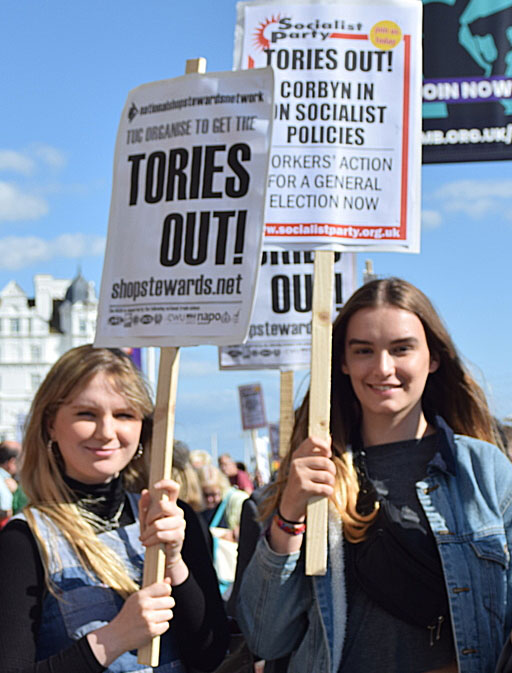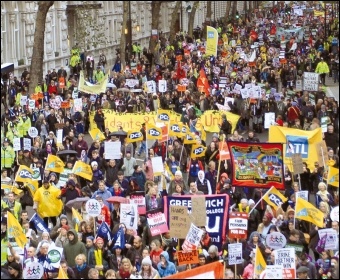Editorial of the Socialist, issue 1056
Trade union movement must put its stamp on swirling events
The routine is pretty well routine now. At Trade Union Congress, Jeremy Corbyn attempts to break through the Brexit fog with a stance that has the potential to unite Leave and Remain workers. He prepares delegates for the general election that he expects and wants and outlines a programme of policies on workers’ rights that has the Tory press panicking about a “return to the 1970s”. He reiterates the position of the Labour-affiliated unions that if elected, a Labour government led by him would negotiate with the EU a pro-worker exit deal that would then be put to a confirmatory referendum.
Then, a day later, deputy leader Tom Watson pops up to contradict everything Corbyn has said, calling for Labour to put a second referendum before a general election and campaign to “unambiguously and unequivocally back Remain”! More pressure is piled on from a meeting of 100 Labour councillors backing Watson’s position. At the same time, MPs on the left, led by shadow chancellor John McDonnell, queue up to declare that they would campaign for Remain in any referendum.
Unions must mobilise
It is more vital than ever that Corbyn stands firm and the labour and trade union movement puts its stamp on these swirling events. Corbyn’s speech at the TUC was a start. He called for a return to national collective bargaining, promised to scrap universal credit and zero-hour contracts, repeal the anti-trade union laws and introduce a £10-an-hour minimum wage by next year.
But now he and the unions have to build on that and use those and other policies to mobilise the working class. It was a serious mistake for the TUC not to call an emergency demonstration to demand a general election. Motions for such action had been put forward by Socialist Party members in a number of unions. But, unfortunately, the debate at TUC wasn’t the platform for the struggle that is necessary.
When MPs return after Boris Johnson’s prorogation, he will undoubtedly face a critical test. But so too will Jeremy Corbyn. Watson has clearly set out his stall and behind him and the Blairites lie the other pro-capitalist parties and the capitalist establishment. They have common interests in wanting to join together to foil a Corbyn government.
The overwhelming majority of the bosses want to remain in the EU or as closely aligned as possible. They want to retain their advantages of this trading bloc and the Thatcherite neo-liberal, anti-worker rules that govern it. These enshrine privatisation and the ‘race to the bottom’ through laws such as the posted workers’ directive.
They also fear a Corbyn-led government elected on the 2017 manifesto and the confidence this could give to workers to go on the offensive and demand more than the important but limited policies this contained. The stated dread of the bosses and their political representatives of a return to the 1970s isn’t about workers gaining one or two more rights. The 1970s was a period of intense class struggle. Last year, 273,000 working days were lost through strike action. In 1972, it was nearly 24 million and nearly 30 million in 1979.
Courts not neutral
Those on the left, like shadow chancellor John McDonnell, who are today misguidedly talking about the sanctity and neutrality of the judiciary, should remember that the courts were used by Tory governments in the 1970s and 80s against workers in dispute. In 1972, there was a virtual general strike when millions of workers took action to defend the London dockers’ leaders who were jailed in Pentonville prison. Similarly, the full force of the state, including the courts and police were thrown at the striking miners in 1984-85. They are used today and will be used in the future on a larger scale against workers who move into struggle.
Based on the strength of workers in the 1970s, with nearly 13 million organised in unions compared to 6.2 million today, the gap between rich and poor was its narrowest in modern times. But with the end of the post-war boom, and declining profit rates, the British bosses turned towards Thatcher and her counter-revolution against the organised working class. Now they fear that the election of a Corbyn government could once more raise the sights of workers, pushing Corbyn further to the left, and again alter the balance of forces against them.
The capitalists are relentless in their efforts to prevent such an outcome, and the Blairites are one of their main tools in this endeavour. The best way for Corbyn to face them down is to fight for an election on the most radical pro-worker manifesto. But the more he prevaricates, the more he emboldens the Labour right. If Corbyn had gone for an election after Johnson lost his first Parliamentary vote, he would have had the ideal public platform to decisively challenge him. Not only by accepting the offer of an election, but boldly proclaiming that he would stand on his anti-austerity programme.
Corbyn made a serious mistake in retreating before the pressure of the Blairites in 2016 and going against his historic left-wing opposition to the EU. This opened up a vacuum for right-wing populists such as Farage and Johnson to exploit, appealing to disaffected workers, many of whom voted Leave to strike a blow at the establishment, and decades of the bosses’ offensive and Tory austerity.
Bridging Brexit divide
But Corbyn, along with union leaders like Len McCluskey from Unite and Dave Ward of the Communication Workers Union, is at least attempting to find a course that can appeal to workers across the Brexit divide.
Imagine if he spoke directly to the 100,000 Royal Mail workers, many of them Leave supporters, who are currently balloting for strike action against bullying management, that if elected he would re-nationalise Royal Mail? Or if he promised to the 5,000 workers facing the dole in the British Steel works in Scunthorpe, Yorkshire and in the north east, that he would nationalise the plants to save their jobs and communities? Corbyn’s pledge of re-nationalising the railways was one of his most popular policies in 2017 with transport workers and commuters.
Corbyn should visit hospitals around the country, promising to force out the privateers and contrasting himself to Johnson, who would like to invite the leeches of private healthcare into the NHS from the US and elsewhere. He should get his pledge to end privatisation out to the legions of low-paid outsourced workers, many of whom have been taking action in councils, the NHS and the civil service.
Yet every one of these policies would come up against the neo-liberal rules of the EU. Jeremy Corbyn promises that if elected he will lead negotiations with the EU on an exit deal. We believe his red lines should be to eliminate precisely those EU rules that would attempt to hem his government in, such as restrictions on nationalisation and state aid, exposing the true class character of the EU. His talks should be transparent and accountable to the labour and trade union movement and visible to workers here and across Europe.
The impact of the EU bosses club being challenged would be enormous. From the French workers currently on a pensions strike to the ‘gilets jaunes’ yellow vest movement – both against the pro-EU Macron, as well as working-class people in Greece, Spain, Italy, Ireland, Portugal and other countries who have suffered from EU austerity. Along with a mobilised workers’ movement here, this would be the most powerful leverage to force a pro-worker deal that could really resolve the Brexit crisis in the interests of the working class. But such a movement should be the platform to build a movement to overthrow the capitalists to be replaced by a socialist society.










